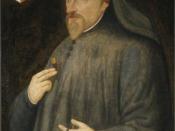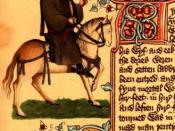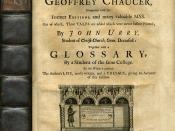In England's Middle Ages, Christianity played a defining role in the ethics and morals in English society. Geoffrey Chaucer, the author of the Canterbury Tales, was clearly influenced by Christian morals and ethics in his writing, as shown through the comparison of the miller's and the pardoner's tales. Through blending his religious and social beliefs, Chaucer created this compilation of tales which illustrate his own social values and religious ethics. While both the miller's and pardoner's tales aim to expose the flaws concealed by the upper classes, Chaucer creates separate tones to correspond with his attitude toward the moral in each tale.
The miller's tale mocks people who blindly follow social institutions. Chaucer's intention is shown when John the carpenter is tricked by Nicholas, who says that there "shal fall a rain... in lasse than an hour shal al be dreint, so hidous is the showr" (411). Upon hearing Nicholas' lie, John immediately build 3 boats and hides himself inside one of them while his wife and Nicholas sleep with eachother.
John's actions mock loyal husbands and the institution of marriage because his blind faith in marriage and his wife's loyalty leads to his downfall. Although this tale points out people's flaws in society, Chaucer maintains a humorous tone in the characters throughout the story. For example, the bawdy diction describing her "ers" as having a "beerd" (635), and how the tale ends with every "folk gan laughen at his fantasye" (732), shows that the subject matter is treated jokingly by Chaucer, who does not seem to take the moral of this story very seriously. Although Chaucer implies that the social institutions created by man must be followed cautiously, his comical tone suggests that his outlook is simply his opinion and not his firm belief.
The Pardoner's tale...


